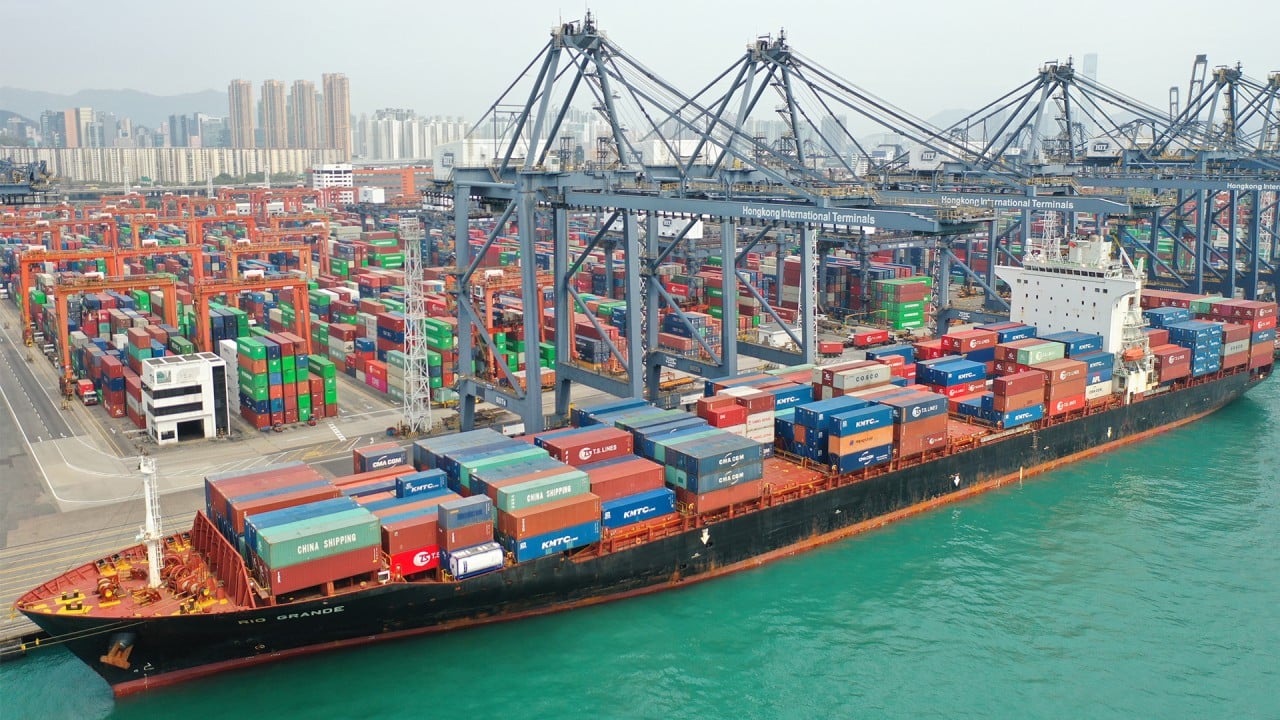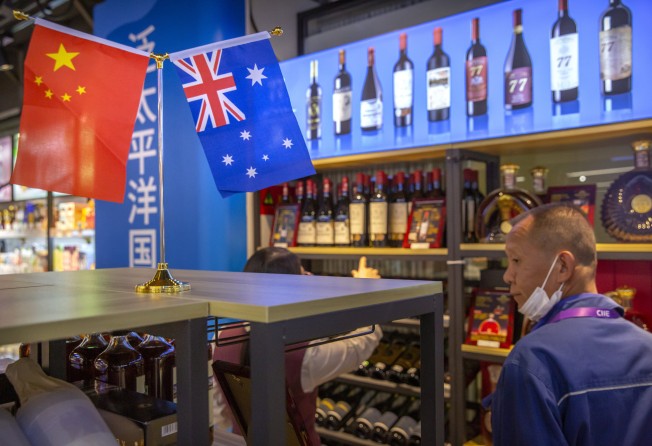
09:20
Trade ‘only one part of the battle‘ in China-Australia dispute, says legal expert Bryan Mercurio

Threats of defamation suits against academics and journalists by an Australian federal government worker. Calls for the firing of a prominent China scholar. An online hate campaign against a think tank analyst who has researched alleged forced labour in Xinjiang.
Even for a topic known to generate heat, Australia’s debate on China is plumbing new depths of rancour. With Sino-Australian relations languishing at their lowest point in decades, those who weigh in on how to manage the country’s ties with its largest trading partner are facing blowback ranging from harassment and threats, to the spectre of legal action.
“You end up getting a very emotionally-driven discussion,” said Dominic Meagher, a visiting fellow at the Australian National University’s college of Asia and the Pacific. “It doesn’t seem to be a good environment for understanding truth, what really is happening.”
“If everything is so politicised, it becomes hard to know what’s real,” he said.
In recent weeks, lawyers for Geoff Wade, a researcher in Canberra’s Parliament House Library, have threatened five parties including journalists and a former diplomat with a defamation lawsuit.
One of the parties is independent journalist Marcus Reubenstein, who wrote and published a story questioning Wade’s intentions for including a publicly-available photo of nine Australian-born schoolchildren aged between seven and eight – some with Chinese ancestry – in a Twitter thread that drew links between a Chinese language teachers’ association and the Chinese Communist Party. The children’s not-for-profit school, which has denied any links to the teachers’ association named by Wade, is partly funded by the Australian Capital Territory government.
Besides Reubenstein, Wade’s lawyers, a Canberra-based firm that also handles legal matters for the Australian government, sent letters to investigative journalist Michael West and former Australian diplomat John Menadue, who carried the story on their news platforms titled Michael West Media, and Pearls and Irritations, respectively.
The letter to West asked that the story be taken down and that Wade be given an apology and damages for defamation.
Similar defamation lawsuit letters were sent to the principal of the school Suzie Cong, who was quoted in Reubenstein’s story, and researcher James Laurenceson, who is the director of the Australia-China Relations Institute and who shared Reubenstein’s story on Twitter.
West, who described the debate on China as “out of control”, said he had no intention of meeting the letter’s demands.
“I respect his right to free speech and he should respect our right to free speech,” he said, referring to Wade.
“We have not defamed him.”

In a video West published last Saturday, the veteran journalist who specialises in exposing government and corporate fraud said: “In China, they have armies of censors pulling the plug on people’s social media feeds. In Australia apparently we have law firms muzzling those who want to air these issues publicly because they are in the public interest.”
Menadue declined to comment, while Reubenstein said: “This is about free speech and government funded lawyers trying to shut down critics of the Australian government’s China policy.”
Wade, a former fellow at the Australian National University, has published more than 40,000 tweets about China and links between Australians and China since 2014. He did not respond to This Week in Asia’s request for comment.
LOYALTIES QUESTIONED
Ethnic Chinese and other Australian citizens with business or academic links to China have increasingly pointed to instances of their loyalties being questioned by local media, hawkish commentators and even elected parliamentarians.
Jane Golley, director of the Australian Centre on China in the World at ANU, has in the past week had to fend off calls for her sacking after she used an address at the National Press Club last week to highlight an anonymously-authored non-peer reviewed paper that she said “debunked” reports of human rights abuses in westernmost Xinjiang.
Golley later acknowledged she should not have said the paper “debunked” reports of rights abuses, but “challenged” certain claims, including the widely-cited estimate that 1 million Uygurs are being detained in reeducation camps.
The paper, which was circulated on social media, was subsequently criticised as lacking academic rigour by China researchers including US-based German anthropologist Adrian Zenz, who has alleged that there are widespread human rights abuses of mostly-Muslim Uygurs in the cotton industry in Xinjiang.
China has banned Zenz from entering the country or doing business there.
Golley said she had highlighted the paper and its anonymous authorship to make a point about the stifling atmosphere that was taking hold and “the chilling effect that it’s having, and especially on Chinese-Australians”.
“It is definitely getting worse and it’s getting worse at a rapid rate,” Golley said.
“I still think trying to understand other perspectives is important, but that doesn’t seem to be the mainstream approach to this.”
Vitriol has come from outside Australia too. Vicky Xu, a researcher with the Australian Strategic Policy Institute, funded by the Australian and US governments and weapons manufacturers, found herself the target of an online hate campaign in China this month after publishing research detailing evidence of Uygur forced labour in the supply chains of dozens of well-known international brands.
Xu, who has engaged in heated debates on Twitter with those opposing her views, this week deactivated her account. Her name trended on Chinese social media following a deluge of attacks against her, with posts on platforms such as Weibo describing her as a race traitor and “female demon”, and spreading lurid fabricated details about her sex life.
Some of the attacks against Xu, which have racked up millions of views, were reposted and amplified by Chinese state media.
In an appearance on the Australian Broadcasting Corporation’s Q+A this month, Xu described the experience as akin to being “lynched in the Chinese media”. She declined to comment for this article.
Rowan Callick, a fellow at Griffith University’s Asia Institute and former China correspondent, said Beijing was primarily at fault for the “increased emotional tone of discussion” around China.
He blamed the “[Chinese Communist Party’s] insistence that any criticism of the party or of the People’s Republic’s political leaders or of its governance more broadly, comprises automatically also a criticism – or worse – of ‘China’ and of people who are ethnically Chinese.”
But Laurenceson said some of Beijing’s critics in Australia were embracing the party’s tactics themselves. He said it had been clear from the beginning that Golley had been attempting to make the justified point that academic freedom was under threat in Australia, not just China.
“This includes those who seek to destroy an academic’s reputation when they raise questions or espouse views about China that some listeners find offensive, and even pressuring universities to terminate their employment,” Laurenceson said.
He declined to comment on the defamation lawsuit threat, but referring to the infamous campaign by US Senator Joseph McCarthy in the 1950s to expose supposed Communist sympathisers, said: “We are perilously close to entering a McCarthyist era.
“If this trend continues, we won’t need to worry about the [Chinese Communist Party] eroding academic freedom in Australia. These local China hawk Red Guards will do so far more effectively.”
Besides rising geopolitical stakes, social media, and widening ideological divisions, Meagher, the ANU fellow, suggested there was also a more prosaic explanation for the seemingly toxic nature of the debate.
Australia, with its heavy reliance on Chinese trade, sizeable China-born and ethnic Chinese population and location in the Asia-Pacific, was simply more focused on China than almost any other country.
“It looms large in our economy, it looms large in our society, in our foreign policy,” he said.
“Everything has been about China for most of the last 10 years.”